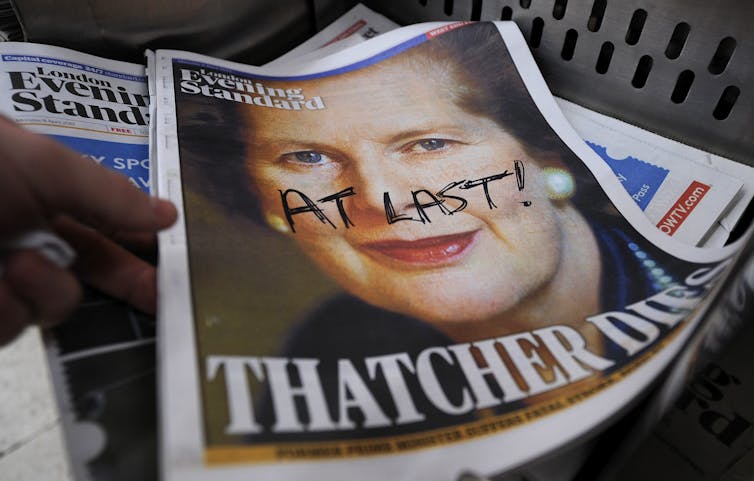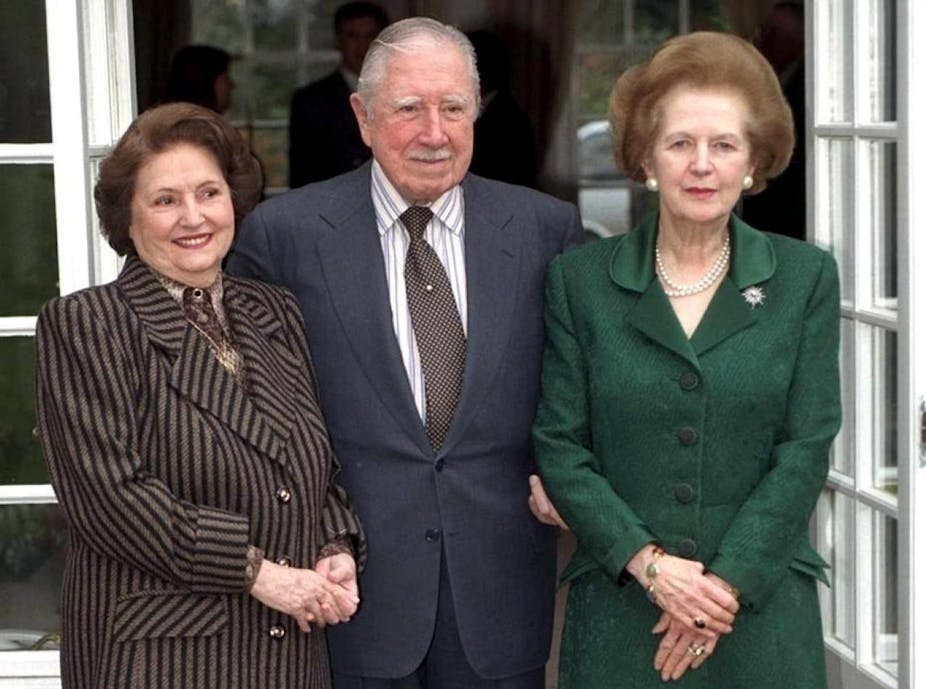In Australia, Martin Ferguson has recently condemned the “class war rhetoric” of the Labor party, but on Monday morning (UK time) one of the world’s greatest class warriors passed away.
Margaret Thatcher died on Monday, and sections of Britain and the world have celebrated the passing of this controversial figure. A small debate has arisen on how one should respond when an elderly, frail woman goes onto greener pastures. I for one will not be celebrating her passing because it is not Margaret Thatcher herself that is the real enemy, but her policies and legacy.
Thatcher lent her political power and agency to the form of class struggle from above which saw a strong anti-union bias, wage and welfare cutting, the privatisation of health, education and transport while at the same time strengthening the authority and power of the state and maintaining a fervent anti-leftism.
The Thatcherite-style policies were also well known in a different context over 10,000 kilometres away in Chile, under the auspices of General Augusto Pinochet, who took power in a coup on September 11, 1973. Thatcher was a strong supporter of the brutal dictator. Along with the murder of thousands of Chileans, Pinochet, like Thatcher, dismantled popular political institutions and oversaw the first country in the world to adopt what would become known as the neoliberal model.
Both of these leaders oversaw the creation of what has been termed a “citizen’s wasteland”. The dictatorship in Chile and Thatcher’s government decimated means of civic association with the aim to build an atomised and individualistic society. It was, as Thatcher famously said, “there is no such thing as society”. In Chile, the neoliberal model was at the heart of a totalitarian project, and in Britain it was to usher in a new era.
And to the chagrin of some, there is a definite connection between the two. The father of current British Labor party leader Ed Miliband, Ralph Miliband said it best:
Mrs Thatcher is the first British prime minister to convey the very strong impression that she could, in suitably fraught circumstances, very comfortably play the role of a Pinochet […] of course in the name of democracy, freedom, law and order, the struggle against subversion and the defence of the constitution.
It was reported in Chile that Britain sent over US$160 million worth of weapons to Chile. Thatcher was a staunch supporter of Pinochet long after both leaders had left power: “today I break my self-denying ordinance and for a very good reason - to express my outrage at the callous and unjust treatment of Senator Pinochet,” Thatcher stated in 1999.
One of the chief targets of both these leaders were the organised working class, from which many in both nations have yet to fully recover. In Chile, union officials were tortured, assassinated and imprisoned. Unions were made virtually illegal and a “flexible” labour system was introduced which stripped them of any right to organise and bargain collectively. And contrary to the “free market” rhetoric, it was strong state intervention which was used to crush the workers.
This would be very familiar to those who lived in Britain in the time of Thatcher. One of her strongest enemies was the National Union of Mineworkers, which she named “the enemy within”. The Thatcher government’s defeat of the NUM was one of the defining moments of her leadership which represented not only a policy victory but one with historical significance. She went on to weaken the power of the working class, overseeing a drastic union membership decline that strengthened business and elite capital. It was class war from above if anyone had seen it before.

What both Pinochet and Thatcher achieved was a brutal offensive on Chilean and British society on behalf of big business hidden under the guise of “national renewal”. They attacked the idea and social base of collective action, attempting to force what in the post-Cold War climate became a catch cry for neo-liberal capitalists: “there is no alternative”. In the Sunday Times in May 1981, she alarmingly stated: “economics are the method; the object is to change the heart and soul”.
But this brand of politics is not just a relic of the past. It was Thatcher and Pinochet who ushered in a new form of late capitalism, one that we are still coming to grips with today. And as Ben Eltham noted in New Matilda, Australia’s own Tony Abbott is the continuation of the policies and ideas of Thatcher.
The bequest she and others have left behind is one of destruction. It is one of inequality and the championing of power and privilege. The destruction of institutional frameworks and powers, but also of labour, social relations and ways of life were all in the interests of big capital. Nothing but class war from above in our late capitalist society.
So, it is premature to mourn the death of one of the greatest class warriors of our time. Although now her, Pinochet and fellow class warrior Ronald Reagan are gone, their legacies live on. We still live under the auspices of a pro-business, anti-union society where the corporate elite rule: look no further than the Institute of Public Affairs dinner attended by Rupert Murdoch, Tony Abbott and Gina Rinehart last week.
In addition, public opinion and political discourse remains the same. The majority of economic departments, governments and research centres advocate the neoliberal model which Thatcher and Pinochet have left us. Maybe when we see the back of her endowment, we can celebrate.
Correction: an earlier version of this article stated Pinochet died under house arrest in the UK. He died in Chile.

